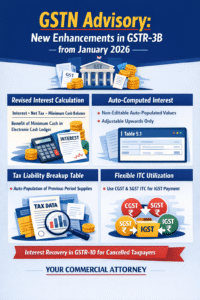The 56th GST Council Meeting held on 3rd September 2025 in New Delhi was historic not just for its rate rationalisation decisions but also for a wide range of trade facilitation measures. These reforms, captured under Annexure-V of the official recommendations, are targeted at simplifying procedures, expediting refunds, reducing disputes, and strengthening the institutional framework of GST.
In this article, we break down these measures in detail to understand their significance for businesses, exporters, small traders, and the economy at large.
1. Risk-Based Provisional Refunds for Zero-Rated Supplies
One of the biggest pain points for exporters has been delays in GST refunds, which locks up working capital and increases cost of operations.
- The Council has recommended amendments to Rule 91(2) of the CGST Rules, 2017, to ensure that exporters get 90% of their eligible refund claims provisionally sanctioned.
- This will apply to zero-rated supplies, which include:
- Exports of goods and services.
- Supplies made to Special Economic Zones (SEZs).
- Refunds will be granted on the basis of system-driven risk evaluation.
- Example: If an exporter files a refund claim of ₹1 crore, ₹90 lakh will be sanctioned immediately, and only ₹10 lakh will be subject to detailed verification.
- Only in exceptional cases, with recorded reasons, can a GST officer withhold the provisional refund.
- Certain categories of taxpayers (e.g., flagged for compliance risks) may be excluded through notification.
Effective Date: 1st November 2025.
This reform will greatly improve liquidity for exporters, enhance competitiveness, and bring India in line with global practices.
2. Provisional Refunds for Inverted Duty Structure (IDS)
Currently, provisional refunds are available only for zero-rated supplies. The Council has decided to extend the same system to refunds arising out of Inverted Duty Structure (IDS).
- In an IDS scenario, GST paid on inputs is higher than GST payable on outputs, leading to accumulated ITC (Input Tax Credit).
- Example: If a textile manufacturer pays 12% GST on inputs but charges only 5% on outputs, they accumulate ITC that needs to be refunded.
- Under the new reform, 90% of such refund claims will be provisionally sanctioned upfront.
- This will be implemented by CBIC through administrative instructions pending amendment to Section 54(6) of the CGST Act, 2017.
Effective Date: 1st November 2025.
IDS refund delays have been a long-standing complaint from sectors like textiles, footwear, and fertilizers. This step is a major relief for such industries.
3. Simplified GST Registration for Small E-Commerce Suppliers
At present, any seller using an E-Commerce Operator (ECO) like Amazon, Flipkart, or Meesho must obtain separate GST registration in each State where they supply goods.
This creates high compliance costs for small businesses and startups.
- The Council has approved a simplified nationwide GST registration mechanism for small suppliers on ECOs.
- The new mechanism will allow sellers to operate across India with one registration, instead of multiple registrations.
- Modalities are to be worked out and presented in upcoming Council meetings.
This will particularly help small traders, rural entrepreneurs, and women-led businesses who use digital platforms to expand their markets.
4. Simplified GST Registration Scheme for Small and Low-Risk Businesses
To ease compliance and bring more small traders into the GST framework, the Council has proposed an optional simplified GST registration scheme.
- Under this scheme, registration will be granted automatically within three working days of submitting the application—provided the applicant is considered low-risk.
- The scheme is available to applicants who, based on their self-assessment, expect that their monthly GST liability on supplies to registered persons will not exceed ₹2.5 lakh (including CGST, SGST/UTGST, and IGST).
- Businesses can voluntarily opt in or withdraw from this scheme as per their needs.
- Importantly, this reform is expected to cover around 96% of all new GST applicants, giving them a hassle-free and faster registration experience.
Effective Date: The scheme will come into effect from 1st November 2025.
This initiative marks a significant step toward ease of doing business, reducing compliance hurdles for micro and small businesses that form the backbone of India’s economy.
5. Place of Supply Rules for Intermediary Services
The Council has recommended omission of Section 13(8)(b) of the IGST Act, 2017.
- Earlier Rule: The place of supply for intermediary services (e.g., BPO services, commission agents, brokers) was considered the location of the supplier, even if the recipient was abroad.
- This meant Indian service providers were denied export benefits and had to pay GST even on foreign service contracts.
- New Rule: Post-omission, place of supply will be based on Section 13(2) i.e., location of the recipient.
- Result: Such intermediary services will qualify as exports (if the recipient is outside India), and no GST will be payable.
This reform is a huge boost to India’s IT, ITeS, and consultancy service exporters, improving competitiveness in global markets.
6. Post-Sale Discounts – Clarifications to Avoid Disputes
Post-sale discounts have been a contentious issue, often leading to disputes between suppliers, dealers, and tax authorities.
The Council has recommended:
- Section 15(3)(b)(i) of CGST Act, 2017 will be omitted → suppliers will no longer be required to establish discount agreements at the time of sale.
- Discounts can be passed on through credit notes under Section 34.
- Circular No. 212/6/2024-GST (26th June 2024) will be rescinded.
Clarifications will also be issued:
- If a discount is passed through financial/commercial credit notes, ITC will not be reversed.
- Discounts offered by manufacturers to dealers (like promotional schemes) will not be treated as additional consideration.
- Clarification on sales promotion schemes to avoid unnecessary litigation.
This will reduce litigation, bring clarity, and simplify business transactions.
7. RSP-Based Valuation for Sin Goods
To address tax evasion in high-revenue products, the Council recommended valuation based on Retail Sale Price (RSP) instead of transaction value.
Products covered include:
- Pan Masala
- Gutkha
- Cigarettes
- Chewing Tobacco (Zarda, scented tobacco, unmanufactured tobacco)
This reform ensures that GST is levied on the final retail value, plugging revenue leakages and preventing under-invoicing.
8. Institutional Strengthening – GST Appellate Tribunal (GSTAT)
The Council also focused on building a strong dispute resolution system:
- Operationalisation: The GSTAT will begin accepting appeals before end of September 2025 and commence hearings by December 2025.
- Backlog Management: Cut-off date of 30th June 2026 for filing backlog appeals.
- Role of Principal Bench: It will also function as the National Appellate Authority for Advance Ruling (NAAAR).
This reform will:
- Provide a robust mechanism for dispute resolution.
- Ensure consistency in advance rulings.
- Reduce judicial burden on High Courts.
- Give certainty to taxpayers and businesses.
Conclusion
The facilitation measures under Annexure-V of the 56th GST Council Meeting highlight a strong push towards ease of doing business and taxpayer trust-building.
From 90% upfront refunds for exporters and IDS cases, to simplified registration schemes for small and low-risk businesses, to clarifications on discounts and intermediary services, these steps reduce compliance burdens and promote fairness.
The introduction of RSP-based valuation for sin goods strengthens revenue collection, while the operationalisation of the GSTAT ensures long-term institutional capacity for resolving disputes.
In sum, GST 2.0 is not only about reducing tax rates but also about building a transparent, efficient, and trade-friendly tax ecosystem that empowers businesses, especially small traders, exporters, and startups.




Add comment